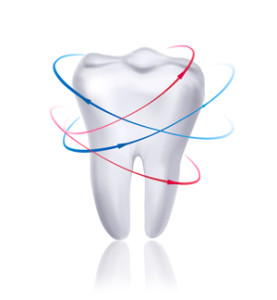The Importance of Routine Dentist Visits
October 13, 2014Share Your Smile!
February 2, 2015What is a Fluoride Treatment? (And Why Do I Need It?)
Every Day Attacks
Every day, teeth fight against demineralization. Demineralization is when minerals in your enamel are lost or worn away as they are attacked by acids, including plaque bacteria, sugar, and other refined carbohydrates.
Luckily, minerals can be redeposited. Remineralization (redepositing of minerals like fluoride and calcium) can occur when we eat certain food, or drink fluoridated water. However, if more minerals are lost than are redeposited, the result is tooth decay.
What is a Fluoride Treatment?
A fluoride treatment contains a much higher concentration of fluoride than fluoridated water, toothpastes, and mouth washes. Fluoride, when used appropriately, is a safe and effective way to prevent cavities[i], and many dentists use routine Fluoride treatments to prevent tooth decay. Treatments performed by your dentist may be given in a few different forms: as a gel, foam, or varnish, and typically takes only a few minutes[ii].
Who Should Get The Treatment?
Fluoride is especially important for these groups of people[iii][iv]:
- Children between the ages of 6 months and 16 years, during the phase when primary and permanent teeth are forming and emerging;
- Those suffering from dry mouth, gum disease, or with a history of frequent cavities;
- Those with crowns, bridges, or braces;
- Those with eating disorders, drug or alcohol abuse, or poor diets, and
- Those undergoing head and neck radiation therapy.
When Should You Get The Treatment?
Some people believe that fluoride treatments are specifically for children and teens. However, as research indicates that fluoride is important in both strengthening developing teeth and fighting tooth decay, and that both children and adults benefit from treatment.
During your next dental visit, ask Dr. Leonard if he recommends a fluoride treatment for you. Frequent fluoride treatments (every 3, 6, or 12 months) may be recommended by your dentist, depending on your oral health.
Fluoridated Water, Toothpaste, and Rinses
Many communities fluoridate their water to reduce the number and severity of cavities, the need for fillings and tooth extractions, and the amount of pain and suffering associated with tooth decay[v]. Toothpaste and mouth wash may also contain fluoride in order to reduce cavities and decay.
While fluoridated toothpastes and mouth rinses are a good way to receive small amounts of fluoride, if you use them, you should make sure not to rinse with water after use[vi], as this may decrease its effectiveness.
See It to Believe It
To see the benefits of fluoride for yourself, or to help explain the benefits to your child, you can run a quick experiment using fluoride rinse, two eggs, some white vinegar, and 3 containers. Follow these directions, provided by HealthyTeeth.org.
- Pour four inches of fluoride rinse into one container and place one egg in the solution. Let sit for 5 minutes, then remove.
- Pour four inches of vinegar into each of the two remaining containers.
- Place the Fluoride-treated egg into one container, and the untreated egg in the other container.
- Watch what happens to the egg that was not given the ‘fluoride treatment.’**
If you don’t wish to conduct the experiment, you can see the results at the bottom of this page.
Ask Dr. Leonard if a fluoride treatment would benefit your oral health.
**Experiment results: You will notice that the vinegar, which is an acid, starts to bubble as it attacks the minerals in the eggshell that is not protected by fluoride.
Sources:
[i] American Academy of Pediatric Dentistry http://www.aapd.org/media/Policies_Guidelines/G_fluoridetherapy.pdf
[ii] American Dental Association, http://www.ada.org/~/media/ADA/Member%20Center/FIles/patient_72.ashx
[iii] WebMD http://www.webmd.com/oral-health/guide/fluoride-treatment
[iv] American Dental Association, http://www.ada.org/~/media/ADA/Member%20Center/FIles/patient_72.ashx
[v] CDC, http://www.cdc.gov/fluoridation/faqs/
[vi] American Academy of Pediatric Dentistry, http://www.aapd.org/media/Policies_Guidelines/G_fluoridetherapy.pdf
